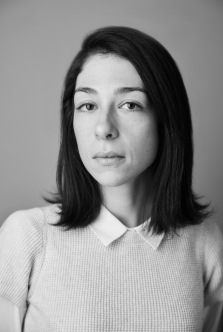Each year, 4-6 emerging translators are awarded $1,000 each to travel to the ALTA conference, where they participate in panels, workshops, and readings. At the conference, ALTA Fellows are invited to read their translated work at a keynote event, giving them an opportunity to present their translations to an audience of translators, authors, editors, and publishers from around the world. Applications to be an ALTA Travel Fellow are open this year until April 15, so apply today!

Elina Alter was awarded a Travel Fellowship to attend the 2018 ALTA conference in Bloomington, IN.
Several years ago, there was a small bookshop in St. Petersburg; you found the entrance by walking through two linked courtyards, and perhaps by ringing a bell. The shop had a funny name, a couple of couches, and some adjoining rooms used, I think, for literature-adjacent purposes; talking, eating, sleeping. The books were in Russian, many of them translations, and I sat on a couch there once reading a new literary magazine and waiting for the summer rain to end, and one of the women working there made me a cup of tea.
For Russian literature, like all literatures most of the time, translation is crucial. It’s the way an art develops; ideas arrive at your shore via a curious, concerning, or enticing stranger, and are “answered” in your own language or languages, and so on. In Russia, this continuity and development was stymied for much of the twentieth century, because totalitarian governments are not interested in conversations or ideas. Readers of Russian did not have Ulysses in full until 1989. Daniil Kharms, one of the century’s most original writers, translated into English by Matvei Yankelevich, among others, was not even known to most Russians until the Soviet Union ended.
Traveling to the American Literary Translators Association conference last fall, thanks to ALTA’s generous fellowship for emerging translators, I thought about the writers who are important to the people I know, many of these writers first encountered in translation. Some person or people had thought and felt deeply enough about their work to build a vehicle for it, sending it forth in hopes of its finding a port. And in Bloomington, a lovely university town with a forest growing on its campus, I found these people—translators, writers, publishers and editors I admire—very un-metaphorically present, and eager to talk. Like earlier Fellows, I kept realizing that someone I had been read reading for years was beside me balancing their phone and their coffee, or in the next room reading a poem.
As other Fellows have suggested, the pleasures of ALTA, like the pleasures of a good bookstore, are artistic, social, intellectual. Also, it’s a fun place to be. Listening to the other Fellows—Aaron, Brian, Lizzie, Maggie, and Mariam—was like walking into a series of surprise parties: unexpected, immensely gratifying and memorable. And one of ALTA’s particular strengths, I learned, is that its events address not just the translations themselves but the translation-adjacent questions: research and criticism, trivia, logistics and politics. And so the conference is both welcoming and galvanizing: a site of happy encounters and serious enthusiasms. It’s a celebration from which one goes out refreshed, wanting to work.
